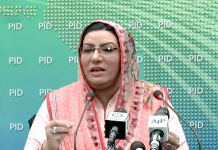ISLAMABAD: As the temperature continued to soar, unannounced load shedding assumed frightening proportions on Tuesday. According to the National Power Control Centre, the electricity shortfall had climbed to 7,000 megawatts (MW).
The countrywide demand of electricity is 17,000 MW, whereas production remained at 10,000 MW.
Load-shedding duration reached 12 to 16 hours in urban areas and 18 hours in rural areas.
Hydro power production has fallen to 2,000 MW due to low water levels in dams and barrages. Government power houses are producing only 4,000 MW, whereas 3,500 MW are being obtained from private power houses.
The predicted shortfall during June-July 2017 is 8,000 MW, with electricity demand expected to reach 22,000 MW.
In June-July 2012, the electricity shortfall was also around 8,000 MW against a demand of 18,000 MW.
PM takes notice: Prime Minister Muhammad Nawaz Sharif on Tuesday expressed annoyance over the laxity by officials for not taking preemptive measures to cope with load-shedding.
Chairing a meeting of the Cabinet Committee on Energy, the prime minister directed the authorities concerned to take immediate measures to mitigate public suffering by using all resources to reduce load-shedding to the possible extent.
The Ministry of Water and Power told the committee that the hot weather had increased electricity demand by over 2,500 MW, whereas the water reservoirs were short of water to meet the needs.
The ministry hoped that the water inflow would increase with the surge in temperature and improve production.
The prime minister expressed anger at the briefing given by the ministry and directed it to fix responsibility for failing to devise a strategy to avert load-shedding. He directed the officials to take steps on a war-footing to control the power shortage.















